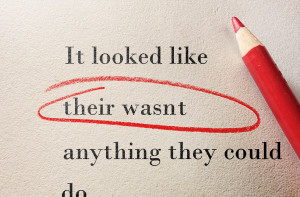In a Blog, is Someone One or Two?
“Beware of common grammatical mistakes, like subject-verb agreement,” cautions Helen Coster in Forbes. Rule to remember: The number of the subject determines the number of the verb.
Use a singular verb form after:
- Nobody
- Someone
- Everybody
- Neither
- Everyone
- Each
- Either
“We can agree that a verb agrees with its subject in person and number,” The Lousy Writer reminds us. Examples include:
- “No one except the ticket holders is admitted.”
- “Every one of us is anxious to build a business.”
- “The famous museum with its thousands of artifacts was destroyed.” (There is only one museum.)
What’s more, The Lousy Writer explains, the meaning rather than the form of the subject controls the number of the verb.
- “The movie ’The Godfather’ was directed by Francis Ford Coppola.” (There is only one movie.)
- “Fifty dollars is too much for those sneakers.” (There is one sum of fifty dollars.)
- “The committee is ready to boycott.” (The committee consists of several persons, but we refer to it here as one group.)
Using plurals and singulars can get quite tricky, Learner’s Dictionary authors admit, especially when a sentence has more than one subject per verb. Here are three examples:
- (two singular) The dog and the cat bother me. (bother is a plural verb)
- (two plural): The dogs and the cats bother me.
- (one singular, one plural) The dog and cats bother me.
In blog content writing, of course, the idea is to avoid confusing the reader and get the point across. Avoiding common grammatical mistakes and making subjects agree with verbs is one healthy habit we content writers can cultivate.
Remember: the number of the subject determines the number of the verb!






Follow us online!